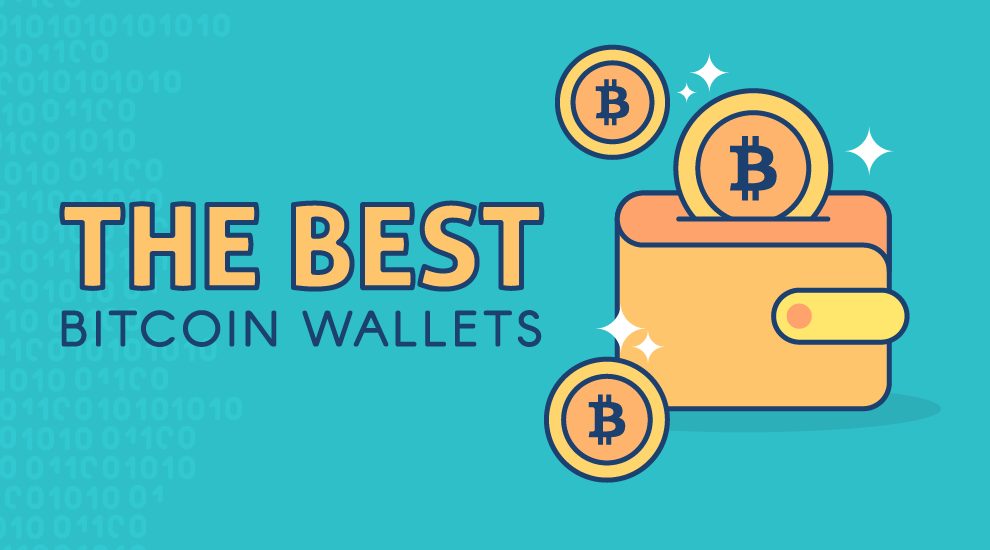
11 Best Bitcoin (BTC) Wallets Of 2024
Welcome to our guide on the Best Bitcoin Wallets of 2024! The Bitcoin market is growing rapidly, with institutional interest and mainstream adoption now at unprecedented levels. It’s an exciting time to buy Bitcoin, and for would-be investors, the first step is choosing a safe and effective wallet to store your funds.
BTC wallets offer a secure solution for safeguarding your BTC holding as well as other cryptocurrencies. With so many different types of BTC wallets available, it is quite important to select the one that aligns with your specific needs.
These top Bitcoin wallets cater to a range of cryptocurrencies including BTC, while some crypto wallets are designed exclusively for Bitcoin. Furthermore, BTC wallets are categorised into two primary types – hot wallets and cold wallets, which we will explain in the next section.
- CryptoWallet.com – Best wallet to spend Bitcoin
CryptoWallet.com is the best Bitcoin wallet for daily use. You can send and receive BTC with ease and manage 800+ other cryptos on multiple blockchain networks. You can also buy and sell Bitcoin instantly and spend BTC with our Crypto Card.
- Ledger Nano X – Best Hardware wallet for BTC
- Trust Wallet – Best mobile wallet
- Exodus – Best desktop wallet

What is a Bitcoin Wallet?
A Bitcoin wallet or BTC wallet is a software or a device that acts as an “account” to hold your BTC funds and stores the data required to access it. You can use your BTC wallet to access your Bitcoin, initiate transactions such as sending Bitcoin (withdrawal), receiving Bitcoin (deposit), and checking the status of transactions.
Every BTC wallet contains a pair of cryptographic keys — a private key and a public key. The private key is a secret code (or password) that enables the owner to access their Bitcoins and make transactions, while the public key is a wallet address that others can use to send Bitcoin (BTC) to the wallet.
BTC Wallets come in various forms, including mobile apps, desktop software, web-based interfaces, and hardware wallet devices. Users can choose the type of wallet that suits their preferences and needs.
Some Bitcoin wallets are custodial, meaning you don’t control the keys — this is similar to a bank having direct control over the money in your bank account, and it serves the same purpose, which is to share or deflect responsibility for looking after your funds to a professional.
Some people prefer non-custodial wallets, which is more similar to walking around with cash in your pocket or keeping money under your mattress. Using a non-custodial BTC wallet means you’re in charge of the funds, and responsible for their safekeeping.
How to Choose The Best BTC Wallet?
If you want to choose the best Bitcoin wallet, the primary factor to consider is whether you prefer a hot wallet or a cold wallet.
Hot BTC wallets are connected to the internet and are convenient for everyday transactions. They include web wallets, mobile wallets, and desktop wallets. While they offer ease of use, they are more vulnerable to online threats compared to cold wallets.
Cold BTC wallets, also known as hardware wallets (for example Leder Nano X), are offline storage solutions that provide enhanced security. These wallets are less susceptible to hacking but may be less convenient for frequent transactions.
Choosing the best BTC wallet depends on factors like security preferences, usage patterns, and the level of control users want over their private keys. It’s essential to research and select a reputable wallet provider to ensure the safety of your Bitcoin holdings.
11 best Bitcoin Wallet Reviewed
CryptoWallet.com
OK, we know what you’re thinking — of course, we’re going to recommend our own product. However, we built CryptoWallet.com specifically to target the issues we found in other popular wallets.
CryptoWallet.com is more than just a wallet. It’s a crypto neobank that offers various crypto banking services including crypto-powered IBAN, SEPA bank transfers using crypto funds, crypto card to spend Bitcoin and other assets directly and a built-in exchange to buy and sell cryptocurrencies.

CryptoWallet.com offers the best wallet for spending BTC directly. We call our custodial Bitcoin wallet “Bitcoin Account” where you can hold your bitcoins and spend it anywhere with our Crypto Card.
On our exchange, you can buy Bitcoin with a credit card or debit card and use it for banking and payments – such as making bank transfers using your Bitcoin, spending it online with the crypto card, or converting it to fiat instantly at any ATMs.
- Type of wallet: Mobile
- Purchase cost: Free
- Fiat currency: Yes
- Own exchange incorporated: Yes
- Ease of Use: Very Easy
Pros 👍
We made CryptoWallet.com to help you buy, store, trade, and sell Bitcoin. CryptoWallet.com is the Best BTC wallet that allows you to spend Bitcoin and other assets practically anywhere. It is an all-in-one solution. It comes with a built-in buy and sell feature that allows you to buy hundreds of cryptocurrencies, with fiat support for both euros and pound sterling.
You can even order your own crypto card and finally spend Bitcoin or over 800 other cryptos as real money! Order your crypto card here.
The ability to spend crypto online or in shops really sets our solution apart in our opinion, as the app provides you with everything you need for Bitcoin in one place.
Cons 👎
CryptoWallet.com is a custodial BTC wallet which means users don’t control their own keys with CryptoWallet.com, unlike non-custodial solutions like Trust Wallet or Ledger hardware wallet. Again, this is a personal preference. Users with paper wallets or non-custodial solutions have sole access to their keys. However, with the card, you can link non-custodial wallets and spend funds directly from them if you wish, instead of the CryptoWallet.com wallets.
Of course, self-custody means no exchange, no debit card, no customer support, no community, and no rewards program. We offer an enterprise-grade level of security, as well as all the perks mentioned above. We’re happy to put our name forward as the best wallet out there for users looking for the all-in-one Bitcoin wallet solution.
Ledger Nano X
The Ledger Nano X is a highly regarded hardware crypto wallet known for its mobile support (via Bluetooth) exceptional security features and wide-ranging coin support. Ledger the best Bitcoin wallet if you want to store large amounts of BTC for a long period of time.
Hardware wallets like Ledger is the SAFEST way to store Bitcoins (BTC) because your digital assets remain offline, protecting them from online threats and providing peace of mind for long-term cryptocurrency storage. It’s a trusted choice among crypto enthusiasts for safeguarding their investments.

As a product from Ledger, a prominent name in the crypto space, the Ledger Nano X builds upon the success of its predecessor, the Nano S. It offers enhanced storage capacity and compatibility with a vast range of cryptocurrencies.
The standout feature that distinguishes Ledger from Trezor is its Bluetooth connectivity, allowing the hardware wallet to sync with your mobile device, and providing the convenience of managing your cryptocurrencies while on the move.
- Type of wallet: Hardware
- Purchase cost: £109 or €149
- Own exchange incorporated: No
- Ease of Use: Advanced
Pros 👍
Ledger Nano X is the best Bitcoin wallet that offers a “cold storage” solution to safeguard your BTC and other assets. This means that funds are kept offline when not in use. Hardware wallets are considered the most secure BTC wallets. Users can set up the Ledger software on their desktop computer and plug in the Ledger Nano X to transfer cryptos.
Cons 👎
Setups can be complicated for hardware devices, and these crypto wallets are arguably for more advanced users.
Coinbase Wallet (DeFi)
Coinbase Wallet is a cryptocurrency wallet provided by Coinbase, a reputable cryptocurrency exchange. It is the best BTC wallet – ideal for beginners due to its user-friendly interface and strong security features. The wallet supports a vast array of cryptocurrencies, including popular ones like Bitcoin, Litecoin, and Dogecoin, along with thousands of ERC-20 tokens and tokens on EVM-compatible blockchains.
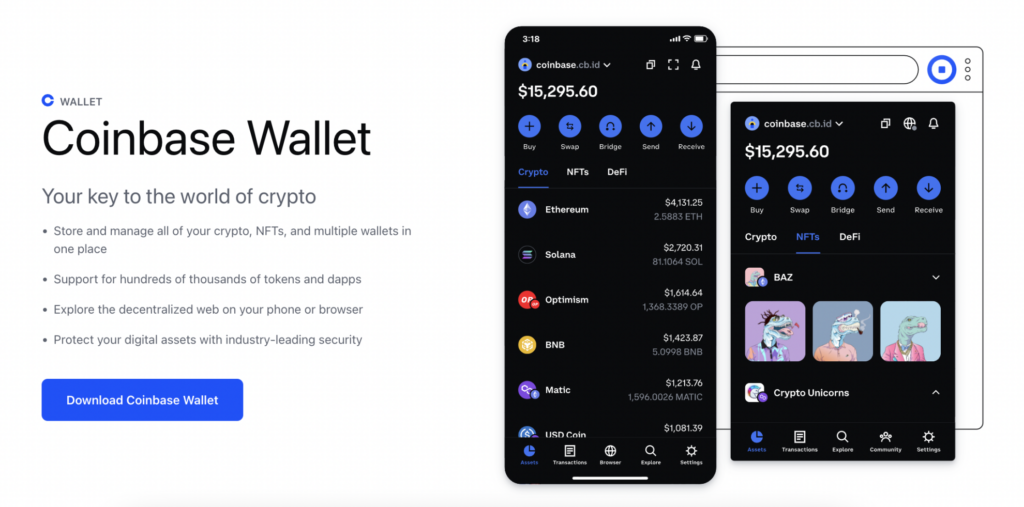
One crucial distinction is that Coinbase Wallet operates independently of the Coinbase exchange. While the exchange offers a web wallet convenient for trading, the Coinbase Wallet is non-custodial, meaning it doesn’t control your private keys.
- Type of wallet: Mobile
- Purchase cost: Free
- Own exchange incorporated: Yes
- Ease of Use: Very easy
Pros 👍
Coinbase Wallet offers a user-friendly interface for easy navigation and supports over 100 digital assets. It prioritizes security with features like multi-signature and two-factor authentication.
Cons 👎
Only available on mobile and tablet devices (except for Chrome extension)
Trezor Model T
The Trezor Model T is a hardware wallet designed to securely store wide range of cryptocurrencies including BTC. It is compatible with Windows, MacOS, and Linux operating systems, offering versatility for various users. With support for over 1,000 cryptocurrencies and robust PIN code protection, USB-C, and a touchscreen interface. Additionally, it is compatible with the Exodus wallet and the wallet boasts a high trust rating, underlining its reliability and security.
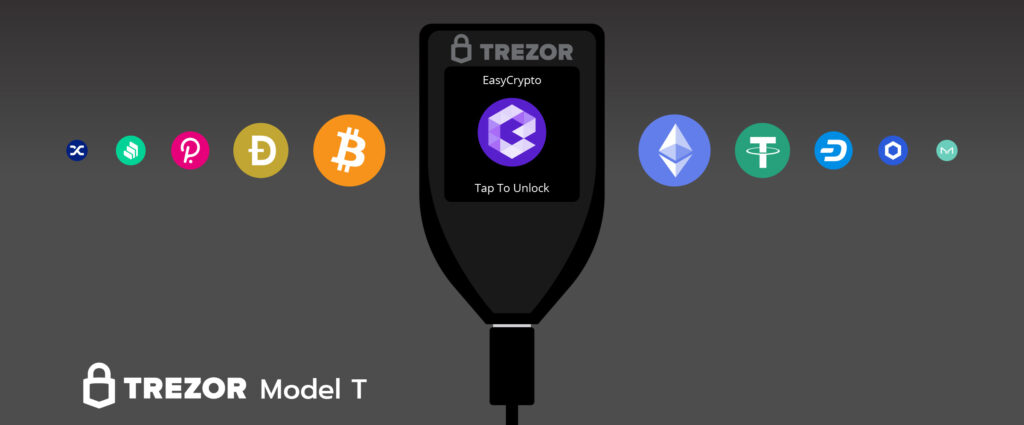
Trezor Model T is also one of the best hardware wallets to store Bitcoin. It is an ideal choice for beginners due to its simple setup process. It distinguishes itself by enabling users to purchase assets and tokens directly through its Trezor Wallet application, offering a unique feature not found in most other software wallets or Ledger hardware wallets.
However, it’s worth noting that it comes at a relatively higher initial cost compared to other cryptocurrency wallets on the market. Read the full Trezor hardware wallet review.
- Type of wallet: Hardware
- Purchase cost: £190 or €219
- Own exchange incorporated: Yes
- Ease of Use: Beginners
Pros 👍
Like Ledger, Trezor is a hardware wallet that offers better security than software BTC wallets or “hot wallets”. Trezor is considered one of the best Bitcoin wallets that offers support for a growing number of currencies and is compatible with certain online wallets.
Cons 👎
Unlike Ledger, Trezor doesn’t offer any mobile support. This means users cannot access their crypto funds instantly, especially on the go.
Trust Wallet
Trust Wallet is the best Bitcoin wallet for mobile. It is a top choice for mobile due to its outstanding features and impressive versatility. As our preferred mobile BTC wallet, it stands out for its user-friendly app interface, extensive support for decentralized applications (dApps) and NFTs, and an extensive array of supported digital assets.
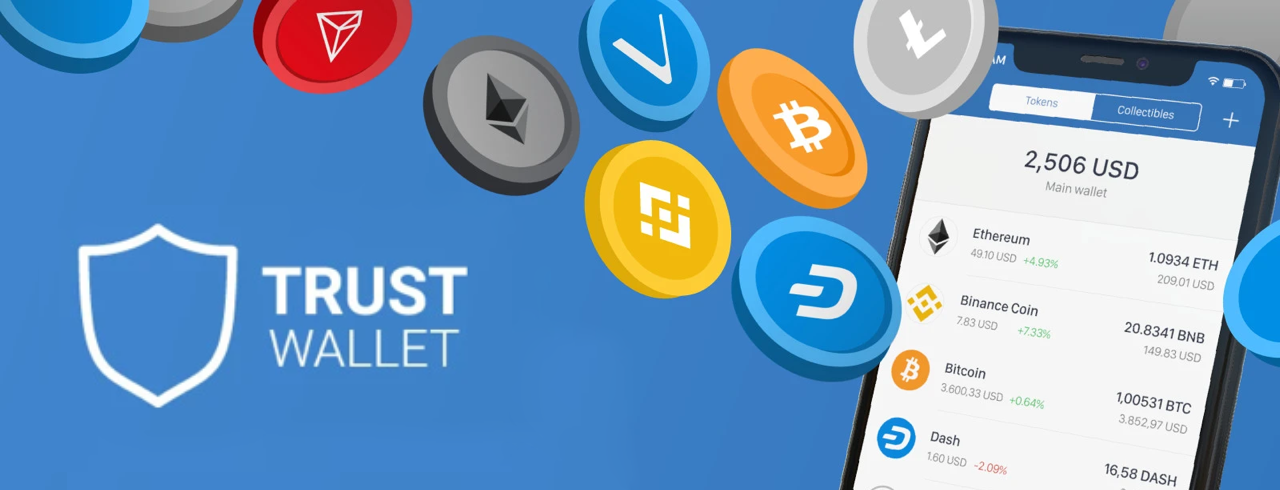
Trust Wallet supports a range of cryptocurrencies, including major coins like Bitcoin (BTC) and Ethereum (ETH), as well as numerous ERC-20, BEP-2, and BEP-20 tokens. Users can manage multiple assets within a single wallet.
Trust Wallet is a non-custodial wallet, meaning users have full control over their private keys and funds. It doesn’t rely on a centralized third party to manage your assets, enhancing security and privacy.
- Type of wallet: Mobile
- Purchase cost: Free
- Crypto exchange: Partners’ website
- Ease of Use: Beginners
Pros 👍
Trust Wallet, chosen as the top mobile crypto wallet, stands out for its user-friendly mobile app interface and extensive support for thousands of cryptocurrencies and tokens. Owned by Binance, it offers an array of features including earning interest on 12 different cryptocurrencies and a built-in Web3 browser for easy access to decentralized applications (dApps) and NFTs.
Cons 👎
However, its association with Binance, which has faced regulatory challenges in the US, may raise concerns for some users, and the wallet’s educational resources on cryptocurrencies are somewhat limited.
Exodus
Exodus is the best BTC wallet for desktop use, and we selected it due to its speedy transactions, user-friendly interface, and versatile features.
Exodus supports Bitcoin as well as various other cryptocurrencies such as Bitcoin, Litecoin, Ethereum and many other cryptos across a range of blockchain networks. It can also get linked to Trezor hardware wallet allowing you to store Bitcoins more safely offline.

Initially designed exclusively for desktop use, Exodus has since expanded to include mobile apps for both iOS and Android platforms. However, its core offering remains its desktop application, which is compatible with Windows, Linux, and Mac operating systems and receives regular updates every two weeks.
One of Exodus’ standout features is its extensive support for cryptocurrencies and NFTs, with over 260 different digital assets available for storage and management. This impressive list covers established cryptocurrencies like Bitcoin, Ethereum, Litecoin, XRP, and Bitcoin Cash, along with popular meme coins such as Dogecoin and Shiba Inu.
Additionally, Exodus offers various apps that enhance its functionality, including tools for live crypto charts, staking, and crypto deposits, making it a versatile and visually appealing choice for cryptocurrency enthusiasts and investors.
- Type of wallet: Mobile and desktop
- Purchase cost: Free
- Fiat currency: No
- Own exchange incorporated: Yes
- Ease of Use: Easy
Pros 👍
Exodus offers support for over 260 different cryptocurrencies, ensuring users can manage a wide variety of digital assets within a single interface. Additionally, its compatibility with Trezor One and Trezor T hardware wallets provides an added layer of security, catering to users who prioritize cold storage solutions.
Cons 👎
There are a few drawbacks to consider when using Exodus. Notably, the wallet may incur high transaction fees on its in-wallet crypto exchange, potentially impacting users seeking cost-effective trading options.
Atomic Wallet
Atomic Wallet is a decentralized, non-custodial crypto wallet available in both mobile and desktop versions. It is another safe wallet to store your Bitcoin. Atomic Wallet is known for its user-friendly interface that allows users to securely and privately manage their digital assets.

Atomic Wallet offers support for Bitcoin as well as a wide range of cryptos, making it a versatile solution for managing diverse digital assets. Users can perform cryptocurrency exchanges within the wallet interface without needing to leave the application. This feature is available in both the mobile and desktop versions.
- Type of wallet: Mobile and Desktop
- Purchase cost: Free
- Buy/Sell Cryptos: Yes
- Ease of Use: Easy
Pros 👍
Users can store Bitcoin as well as hundreds of different digital assets on Atomic Wallet, and also carry out atomic swaps for select currencies (a form of crypto trading). The app is also supported on mobile devices.
Users can earn rewards through in-app staking, making it a convenient option for those interested in participating in cryptocurrency staking.
Cons 👍
Atomic Wallet may not be compatible with a wide range of hardware wallets, potentially limiting options for enhanced security.
Users can’t spend cryptocurrency on real-life goods or services using Atomic, so it’s still necessary to use the app in conjunction with a bank or something similar for that purpose. Like most non-custodial wallets, there’s no customer support, nor are there security features such as 2FA.
Crypto.com (DeFi wallet)
Crypto.com’s DeFi Wallet is non-custodial crypto wallet, which is different from the Crypto.com exchange wallet. This wallet does not require users to create an account on Crypto.com’s exchange platform, giving you full control over your Bitcoin and other digital assets.
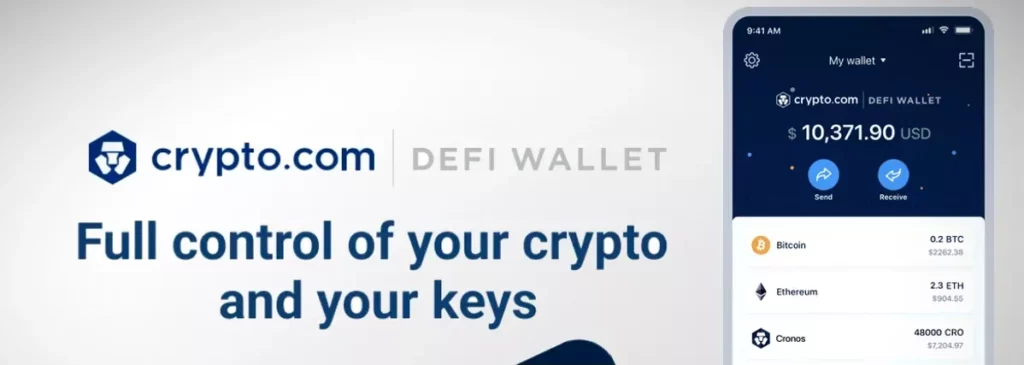
Crypto.com’s DeFi Wallet is recognized as one of the best DeFi crypto wallets due to its comprehensive suite of decentralized finance tools, user-friendly onboarding process, and robust security measures. Designed for users venturing into the world of decentralized finance (DeFi), this wallet empowers individuals with full control over their digital assets and private keys, emphasizing self-custody and security.
- Type of wallet: Mobile
- Purchase cost: Free
- Fiat currency: No
- Own exchange incorporated: Yes
- Ease of Use: Easy
Pros 👍
Key features of the Crypto.com DeFi Wallet include the ability to engage in peer-to-peer crypto swaps and a diverse range of tools for earning passive income from existing cryptocurrencies.
Cons 👎
Just like any other non-custodial wallet, your funds are inaccessible if you lose your private key and recovery phrase. The Built-in token swap also has some geo-restrictions
Electrum
Electrum is a highly respected Bitcoin wallet known for its robust security and user-friendly design. This desktop wallet offers a secure way to store and manage your Bitcoin assets. It employs a hierarchical deterministic structure, providing users with a seed phrase for wallet recovery. Electrum works on Windows, macOS, and Linux, and can be used in conjunction with popular hardware wallets like Trezor and Ledger for added protection.
Electrum offers privacy-enhancing options, supports customizable transaction fees, and provides multi-language support.
- Type of wallet: Desktop
- Purchase cost: Free
- Own exchange incorporated: No
- Ease of Use: Intermediate
Pros 👍
Fast and easy to set up and offer better security than other hot wallets
Cons 👎
Setup and interface are not ideal for beginners and no customer support via chat, email or phone
Guarda
Guarda is a non-custodial Bitcoin wallet that supports BTC and a variety of other digital assets such as Litecoin, Ethereum and erc-20 tokens, USDT, and many more. Guarda is available as a web wallet, desktop application (Windows, macOS, and Linux), and mobile app (Android and iOS), providing users with flexibility and accessibility across various devices.
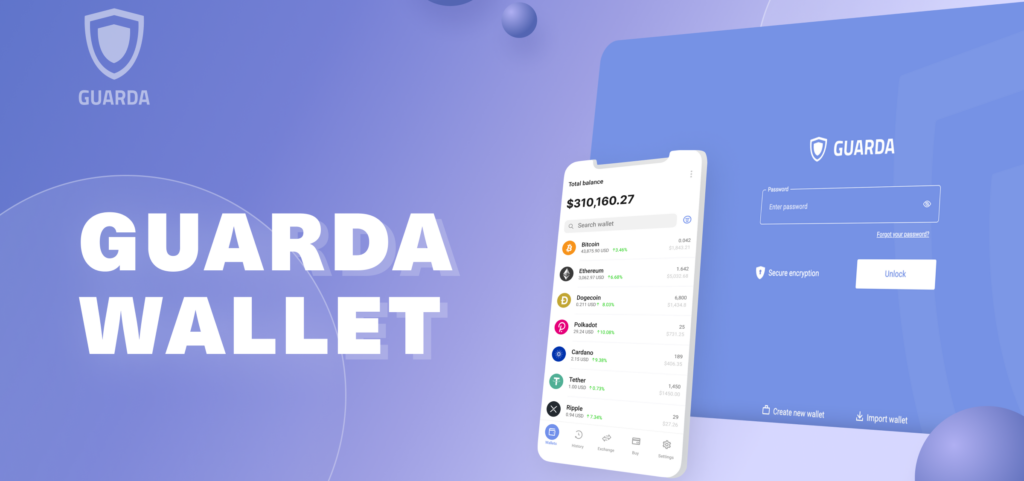
It is one of the best Bitcoin wallet that offers a built-in token swap service, enabling users to exchange one cryptocurrency for another without leaving the wallet. This can be convenient for trading and portfolio management.
Users can store, swap, earn interest, and buy Bitcoin and other cryptocurrencies directly within the wallet. Guarda offers in-app staking, allowing users to earn interest on their digital assets. Many supported cryptocurrencies feature opt-in staking opportunities.
- Type of wallet: Mobile, Web, Desktop
- Purchase cost: Free
- Buy/Sell Cryptos: Swap only
- Ease of Use: Easy
Pros 👍
Guarda allows users to store funds on desktop, mobile, and web browsers. The wide variety of options will appeal to some traders. While Guarda is non-custodial, it still offers customer support in the event of an issue or lost funds. You can create multiple-user wallets for different currencies.
It is one of the best BTC wallets and features an intuitive and user-friendly interface, making it suitable for both newcomers and experienced cryptocurrency users.
Cons 👎
Guarda Wallet charges transaction fees for in-app crypto purchases, with a standard transaction fee rate of 5.5%. This fee structure may be considered relatively pricey when compared to competitors. However, it does offer customizable transaction fees for users.
This solution is still a basic storage-only app, with no added features such as a debit card, bank account number, or affiliate program.
Robinhood
Robinhood is a stock trading app that also offers Bitcoin support.
The Robinhood Wallet app serves as a self-custodial wallet. You can securely store and oversee your cryptocurrency holdings across various networks, including Ethereum, Bitcoin, Dogecoin, Polygon, Arbitrum, and Optimism. Robinhood Wallet empowers you with complete authority over your digital assets, ensuring that you retain ownership of the private keys.
- Type of wallet: Mobile
- Purchase cost: Free
- Own exchange incorporated: Yes
- Ease of Use: Easy
Pros 👍
Robinhood is beginner-friendly, with a simple interface and access to stocks as well as cryptocurrencies.
Cons 👎
Robinhood is also only available in the US.
Best Hardware Wallet for Bitcoin
A hardware or “cold” wallet will be the most secure way to store your Bitcoin tokens. These physical devices are always offline which prevents hackers from gaining access.
To access or transfer funds, you’ll need to connect it to an online device. This extra step, which ensures the safety of your funds, adds a level of complication that some investors prefer to avoid. This is why many investors opt for an easy-to-use assured software wallet like CryptoWallet.com instead.
Trezor and Ledger offer the most reliable cold wallets on the market today. Both have a proven track record of security and offer a range of different features. If you’re looking for your first hardware wallet, you’ll want one that is easy to set up and use.
With Trezor, you’ll need to use a USB to connect it to a computer to use the Trezor Wallet desktop app. This means it may be harder to capitalize on sudden market changes.It’s a good choice for users who are concerned about the security of their funds above all else.
Ledger is Bluetooth-enabled and comes with a desktop and a mobile app called Ledger Live. This makes it that little bit easier to connect and use. It also supports a wider range of tokens. It is an ideal hardware wallet for intermediate traders. Let’s keep looking at Bitcoin wallets.
Types of Bitcoin (BTC) Wallets
There are several types of Bitcoin wallets, each with its own characteristics and use cases.
Hardware BTC Wallet
These are physical devices designed to store Bitcoin offline, making them highly secure from online threats. Examples include Ledger Nano X, and Trezor Model T.
These wallets are highly secure. Funds are stored offline, meaning it’s not possible for hackers to access them remotely. It’s a little tricky to set these wallets up, and buying and selling Bitcoin is more time-consuming as you’ll need to plug your wallet into a computer and operate it from the desktop app.
Crypto investors sometimes keep large sums offline in a hardware wallet (or cold wallet) and smaller sums for convenient trading or spending in an online wallet (or hot wallet).
Read More: Best Hardware Wallets
Software BTC Wallets:
Desktop Wallets: Desktop wallets store Bitcoin data on a desktop computer. You can store your private keys (similar to account passwords) in some of these wallets, and send and receive Bitcoin on your computer.
These wallets are only as secure as your desktop device, so one downside is the potential for funds to be vulnerable to viruses or hackers. Examples are Electrum, Exodus, and Bitcoin Core.
Mobile Wallets: Mobile wallets are typically mobile apps that allow users to send and receive Bitcoin. These wallets offer greater accessibility than desktop wallets, as you can use them anywhere.
With private key wallets, it’s possible to lose your phone and your private keys and thus your funds. However, many mobile wallets are offered by companies with customer support that secure your keys and make it very easy to restore funds should you lose or break your device
Web Wallets: A web wallet can be accessed on any web browser. These are device-agnostic, meaning you can use a mobile phone, desktop computer, tablet, or other internet device to access your funds. They are user-friendly but potentially less secure as they are connected to the internet.
Read more: Best Crypto Wallet
Custodial VS Non-Custodial Wallet
Custodial wallets and non-custodial wallets are two different types of cryptocurrency wallets, each with its own set of characteristics and trade-offs:
Custodial Wallets
Custodial wallets, often provided by exchanges or wallet services, grant a third party control over your private keys and funds. Custodial wallets are often easier to use, making them suitable for beginners. Users can access their funds with a username and password.
Since the Bitcoin wallet provider (company) holds your private keys, they are responsible for security measures, including safeguarding your funds and protecting against hacks. Some custodial wallets offer account recovery services, which can be helpful if you forget your login credentials.
Non-Custodial Wallet
In a non-custodial wallet, you have full control over your private keys and, by extension, your cryptocurrencies. The wallet provider does not have access to your keys.Non-custodial wallets are considered more secure because they reduce the risk of hacks or breaches at the wallet provider’s end. Users are responsible for their wallet’s security.
Non-custodial wallets can be more complex to set up and use, making them better suited for experienced users. These wallets often prioritize user privacy, as they don’t require users to provide personal information.
The choice between a custodial and non-custodial wallet depends on your preferences, experience level, and security priorities. If you value convenience and are willing to trust a third party with your funds, a custodial wallet might be suitable. On the other hand, if you prioritize security and want full control over your assets, a non-custodial wallet is the better option.
CryptoWallet.com – The Best Bitcoin Wallet to Spend BTC
There are many factors to consider when choosing a crypto wallet that allows you to use Bitcoin for its intended purpose. At CryptoWallet.com, you can not only store your Bitcoins but also spend BTC with our crypto card.

The CryptoWallet.com card enables you to spend more than 800 cryptocurrencies directly from your crypto wallet, with real-time crypto conversion and the lowest transaction fees in the market among all currently available crypto cards.
Additionally, you can buy Bitcoin and other cryptos with a credit card and debit card. You can also sell your Bitcoins instantly on our exchange at low fees.
With a CryptoWallet.com account, you can create an IBAN to manage EUR funds, which you can use to buy and sell cryptos and perform crypto-powered bank transfers within the SEPA zone.
Bitcoin Wallet FAQs
What is a BTC wallet?
A BTC wallet, or Bitcoin wallet, stores your crypto funds safely — as long as you look after the private keys! A BTC wallet is a piece of software or a physical device that stores bitcoins. It can be thought of a little like a regular wallet, or a bank account.
When you open a BTC wallet, you receive a string of characters and numbers called a public key. This is the wallet address, and if you want someone to send you BTC, you need to give them this address. You’ll also receive another series of characters and numbers called a private key, and this one is similar to a password. If you want to send BTC from your wallet, you need to enter this password. You don’t need to take any action to receive BTC.
Some BTC wallets are non-custodial, meaning you don’t have control of the private keys. This takes us back to the bank account analogy — you’re not responsible for the funds, a professional is. Technically, it would be possible for them to freeze your funds under extreme circumstances, such as government intervention.
Some people prefer to go for a non-custodial wallet, meaning they’re solely in control of the funds. This is similar to carrying cash in a wallet, or under a mattress. Nobody else is responsible for the safekeeping of these funds, and like regular fiat money, some people aren’t comfortable keeping large sums on their person or in their house.
Sometimes, the best solution is a hybrid one. One BTC wallet for walking around money, and another for larger sums. Whatever you choose, you’ll need to protect your details to prevent any security breach from taking place. Look after your BTC wallet, and it will look after you!
How do you cash out your Bitcoin wallet?
Cashing out of a Bitcoin wallet has historically been very complicated. It was necessary to join an exchange like Coinbase and sell Bitcoin for cash, then transfer that cash to a bank account over the course of several days. Of course, that’s the beauty of CryptoWallet.com!
With CryptoWallet.com account, you can simply cash out BTC to your bank account instatnly.
Alternatively you can also withdraw Bitcoin (as cash) from any ATM using our Crypto Card, or even spend it directly on anything you like, whether online or in-store. Get your Crypto Card today!
How to add funds to a Bitcoin wallet?
You can add funds to a Bitcoin wallet from any other Bitcoin wallet. You can simply use the public key (wallet address) to send BTC to any Bitcoin wallet.
If you want to buy Bitcoin, you can use any crypto exchange that accepts credit or debit cards. That includes CryptoWallet.com! When purchasing BTC, simply add the wallet address (public key), and the BTC will be transferred to your Bitcoin wallet.
What is Bitcoin cold storage?
Bitcoin cold storage refers to a method of keeping a reserve of Bitcoins offline (on Hardware wallets like Trezor or Ledger), which is completely isolated from the internet or any online computer network. The main purpose of cold storage is to provide a high level of security for your Bitcoin holdings by minimizing exposure to potential online threats, such as hacking, malware, or unauthorized access.
What is a Bitcoin address?
A Bitcoin address is a string of alphanumeric characters that show the destination of a Bitcoin payment. Your address is the same as the public key of your Bitcoin wallet.
Should you use multiple Bitcoin wallets?
Some people like to diversify crypto storage locations. When dealing in large sums, it can be a good idea to keep some funds on a hardware or offline wallet and some on an online wallet for easy trading or spending.
Which is the safest Bitcoin wallet?
When considering wallet safety there is no ‘one size fits all’ wallet. Fortunately, there exists a wide variety of different wallet systems that are each tailored to different accessibility and security needs.
In terms of raw security, hardware wallets are considered to be the most secure means of storing Bitcoin. Hardware Wallets such as Ledger or Trezor are stored on a device similar to that of a USB key and are generally offline or ‘cold,’ and therefore extremely resistant to virus attacks. However, this type of wallet system may not be suitable for everyone’s needs, as they aren’t as easily accessible as other wallet types and are considered to be a little pricey.
Desktop or Mobile Wallets systems are much cheaper and far more accessible, as they store one’s coins on an app installed onto one’s computer or handheld device. These wallets such as Hive Android or Mycelium have a high degree of accessibility allowing for easy trade through QR codes or Near Field Communication. The drawback to this accessibility is that they are considered ‘hot’ or online, and therefore more vulnerable to malware and phishing attacks.
What is the best crypto wallet?
Every crypto wallet will offer different features and levels of security. Some wallets prioritize convenience while others are focused on security above all else. Ultimately, the best crypto wallet will be the one that matches your requirements.
If you’re looking for the most secure crypto wallet, a hardware wallet would be a perfect choice. These are physical devices which store your keys offline. This makes them less vulnerable to hacks or malware. You’ll need to connect them to an online device to fully use your assets which can be inconvenient.
Software wallets offer much greater convenience as your keys are stored online and you can access your funds from anywhere. They are generally easier to use and set up than a hardware wallet. However, their constant online connection makes them more vulnerable to cyberattacks.
At CryptoWallet.com, we don’t believe that you should have to sacrifice security for convenience. That’s why we’ve protected all funds held in our software wallets.
The mobile app and cryptocurrency exchange are streamlined and intuitive to use. Our crypto wallet combines security, convenience and ease of use to make one of the best crypto wallets on the market.
What is the best crypto wallet for beginners?
If you’re looking to get started in the world of trading cryptocurrencies, you’ll want a crypto wallet tailored to your needs. An ideal crypto wallet would be secure, convenient and easily operated.
Software wallets will be the easiest wallet to set up and use. They are more vulnerable to cyber attacks as they are constantly online but they are far easier to use. There are two types of software wallets available, self-custody or custodial.
With a self-custody wallet, you have full control over your keys. While many investors prefer this, it comes with more responsibility and you may need to be more tech-savvy than with a custodial wallet. If you lose access to your wallet, your funds may be irretrievable.
This is why many beginners choose custodial wallets. With custodial wallets, a third party, like an exchange, manages your keys. This is much more convenient and can be helpful if you lose your keys or login details.
At CryptoWallet.com, we offer one of the most secure custodial wallets. This is ideal for anyone looking to get started safely.
There is a dedicated customer support service for any questions you might have and an Academy if you want to broaden your knowledge. We also offer a cryptocurrency exchange, making our platform a perfect all-in-one option for beginners.
What crypto wallet should I use?
While there are a range of different crypto wallets on the market, the crypto wallet that you should use depends on what level of trading and features you’re looking for. Beginner traders and advanced traders may be looking for different things when it comes to choosing a crypto wallet.
Some platforms offer an entire suite of DeFi products and thousands of coins. These wallets are ideal for advanced traders looking for savings accounts, highly-speculative investment opportunities and more. These platforms are often more difficult to navigate and get used to.
Hardware wallets like Ledger and Trezor are the most secure but also the least convenient. As they are offline devices, you’ll need to connect them to an online device to use. They can be tricky to set up which makes them more suitable for intermediate or advanced inventors.
Software wallets are more suitable for beginners but they are often less secure. They are constantly online meaning you can access your funds wherever you are. This also makes them more vulnerable to being hacked.
If you’re looking for a robust option for beginners, CryptoWallet.com offers all of the convenience of a software wallet while assuring all funds are held. Our exchange is integrated with our mobile app making it extremely user-friendly.
Read More: Best Ethereum Wallet ; Best USDT Wallets ; Best Litecoin Wallet, Best XRP Wallet, Best Solana Wallet